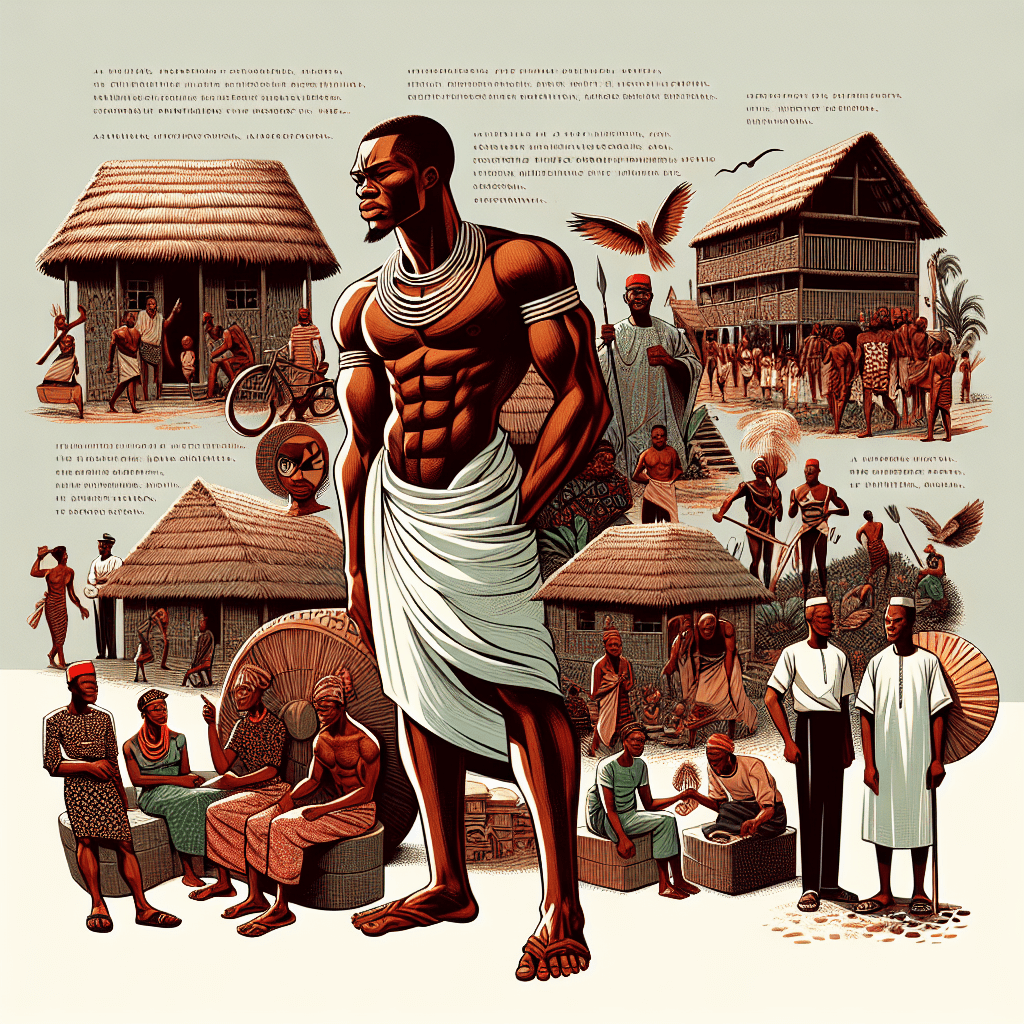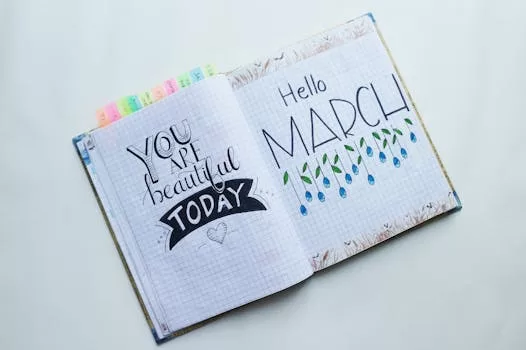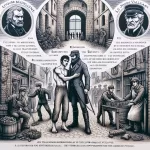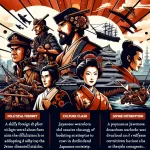-
Table of Contents
“Exploring the Clash of Cultures: A Deep Dive into ‘Things Fall Apart’ – Summary, Themes, and Characters.”
“Things Fall Apart,” written by Chinua Achebe, is a seminal novel that explores the complexities of Igbo society in pre-colonial Nigeria and the profound impact of European colonialism. The story follows Okonkwo, a respected leader and warrior, whose life unravels as traditional values clash with the forces of change brought by missionaries and colonial authorities. The novel delves into themes of cultural identity, masculinity, and the struggle between tradition and modernity. Key characters, including Okonkwo, his family, and community members, embody the tensions and transformations within their society, making “Things Fall Apart” a powerful commentary on the effects of colonialism and the resilience of cultural heritage.
Summary of Things Fall Apart
“Things Fall Apart,” a seminal work by Nigerian author Chinua Achebe, is a profound exploration of the complexities of Igbo society and the disruptive forces of colonialism. Set in the late 19th century, the novel centers around Okonkwo, a respected leader and fierce warrior in the fictional village of Umuofia. Achebe intricately weaves a narrative that not only chronicles Okonkwo’s life but also reflects the broader cultural shifts occurring within his community.
The story begins with Okonkwo’s rise to prominence, which is marked by his determination to overcome the legacy of his father, Unoka, who was known for his laziness and lack of success. Okonkwo’s relentless pursuit of strength and success drives him to become a wealthy farmer and a prominent figure in Umuofia. However, his fear of being perceived as weak leads him to adopt a rigid and often harsh demeanor, particularly towards his family. This internal conflict sets the stage for the unfolding tragedy of his life.
As the narrative progresses, Achebe introduces the reader to the rich traditions and customs of the Igbo people, illustrating their social structures, religious beliefs, and communal values. The arrival of European missionaries and colonial administrators marks a turning point in the story, as these outsiders begin to impose their beliefs and systems on the indigenous population. This incursion not only threatens the fabric of Igbo society but also challenges Okonkwo’s identity and values. The tension between tradition and change becomes increasingly palpable, as characters grapple with the implications of colonialism.
Okonkwo’s personal struggles mirror the larger societal upheaval, culminating in a series of events that lead to his tragic downfall. After accidentally killing a clansman, he is exiled for seven years, during which time the influence of the missionaries grows stronger in Umuofia. Upon his return, Okonkwo finds his village transformed, with many of his fellow villagers embracing the new faith and rejecting traditional customs. This shift leaves him feeling alienated and desperate, as he clings to the past while witnessing the disintegration of his world.
The climax of the novel occurs when Okonkwo, unable to reconcile his beliefs with the changes around him, takes drastic measures. In a moment of despair, he takes his own life, an act that symbolizes the ultimate defeat of his values and the irrevocable impact of colonialism on his community. Achebe’s portrayal of Okonkwo’s tragic end serves as a poignant commentary on the broader themes of identity, cultural conflict, and the consequences of rigid adherence to tradition in the face of inevitable change.
In conclusion, “Things Fall Apart” is not merely a story about an individual but a reflection of the profound transformations experienced by a society in turmoil. Through Okonkwo’s journey, Achebe captures the essence of a culture grappling with external pressures and internal contradictions. The novel remains a powerful exploration of the complexities of human experience, resonating with readers across generations as it delves into themes of identity, resilience, and the struggle for understanding in a rapidly changing world.
Major Themes in Things Fall Apart
In Chinua Achebe’s seminal novel “Things Fall Apart,” a rich tapestry of themes unfolds, reflecting the complexities of Igbo society and the profound impacts of colonialism. One of the most prominent themes is the struggle between tradition and change. The protagonist, Okonkwo, embodies the traditional values of his community, emphasizing strength, masculinity, and the importance of social status. His life is a testament to the rigid adherence to cultural norms, which he believes are essential for maintaining his identity and the integrity of his society. However, as colonial forces intrude, the very foundations of Igbo culture begin to erode, leading to a profound internal conflict within Okonkwo and his community. This clash between the old and the new serves as a microcosm for the broader societal upheaval experienced in Nigeria during the colonial period.
Another significant theme is the concept of fate versus free will. Okonkwo’s life is marked by his relentless pursuit of success and his fear of being perceived as weak, a fear rooted in his father’s failures. This fear drives him to make choices that ultimately lead to his downfall. Achebe illustrates how Okonkwo’s determination to shape his destiny is thwarted by forces beyond his control, including the arrival of European missionaries and the subsequent changes in societal structure. This theme raises questions about the extent to which individuals can influence their own lives in the face of overwhelming external pressures, suggesting that while personal agency is vital, it is often limited by larger historical and cultural forces.
Moreover, the theme of masculinity permeates the narrative, as Okonkwo’s identity is intricately tied to his perception of manhood. He equates masculinity with aggression, dominance, and emotional stoicism, often resorting to violence to assert his authority. This rigid definition of masculinity not only alienates him from his family, particularly his son Nwoye, who embodies a more sensitive and contemplative nature, but also contributes to his tragic fate. Achebe critiques this narrow conception of masculinity, illustrating how it can lead to destructive behaviors and ultimately result in personal and communal disintegration.
Additionally, the theme of colonialism and its effects on indigenous cultures is central to the narrative. Achebe portrays the arrival of European colonizers as a catalyst for profound change, disrupting traditional ways of life and instigating conflict within the community. The missionaries’ attempts to convert the Igbo people to Christianity symbolize the broader cultural imperialism that seeks to undermine indigenous beliefs and practices. This theme highlights the complexities of cultural exchange, as it raises questions about identity, power, and resistance. The characters’ responses to colonialism vary, with some embracing the new religion and others fiercely resisting it, reflecting the diverse reactions of colonized peoples to foreign domination.
In conclusion, “Things Fall Apart” serves as a powerful exploration of themes that resonate far beyond its historical context. Through the lens of Okonkwo’s life and the experiences of his community, Achebe delves into the intricacies of tradition, identity, and the human condition. The interplay of fate and free will, the critique of rigid masculinity, and the examination of colonialism collectively underscore the novel’s enduring relevance. As readers engage with these themes, they are invited to reflect on the complexities of cultural identity and the profound impacts of change, both personal and societal.
Character Analysis of Okonkwo
In Chinua Achebe’s seminal novel “Things Fall Apart,” the character of Okonkwo serves as a complex embodiment of the struggles faced by individuals in a rapidly changing society. Okonkwo, a respected leader and warrior in the Igbo community of Umuofia, is driven by a profound fear of failure and weakness, largely stemming from his disdain for his father, Unoka, who was perceived as a failure due to his laziness and lack of wealth. This fear manifests in Okonkwo’s relentless pursuit of success, which he equates with masculinity and strength. Consequently, he becomes a figure of rigid traditionalism, often resorting to violence and aggression to assert his dominance and maintain his status within the community.
As the narrative unfolds, Okonkwo’s character is further developed through his relationships with his family and peers. His treatment of his wives and children reveals a man who equates love with discipline and control. For instance, his harshness towards his son Nwoye, whom he perceives as weak and effeminate, highlights Okonkwo’s internalized beliefs about masculinity. This strained father-son relationship is pivotal, as Nwoye ultimately seeks solace in the new Christian faith, which stands in stark contrast to Okonkwo’s traditional values. This generational conflict underscores the broader theme of cultural change and the challenges posed by colonial influences, as Okonkwo’s inability to adapt to these changes ultimately leads to his tragic downfall.
Moreover, Okonkwo’s character is marked by a profound sense of isolation. Despite his status and achievements, he is unable to forge genuine connections with those around him. His fear of being perceived as weak prevents him from expressing vulnerability or seeking support, which alienates him from his community and family. This isolation is poignantly illustrated in the latter part of the novel when Okonkwo is exiled for accidentally killing a clansman. During his exile, he reflects on his life and the choices he has made, yet he remains steadfast in his belief that strength and masculinity are paramount. This unwavering adherence to his ideals ultimately blinds him to the shifting dynamics of his society, leading to his tragic end.
Furthermore, Okonkwo’s character can be seen as a representation of the broader struggles faced by the Igbo culture in the face of colonialism. His fierce resistance to change and his adherence to traditional values mirror the collective anxiety of a society grappling with external forces that threaten its very existence. As the novel progresses, Okonkwo’s inability to reconcile his identity with the changing world around him becomes increasingly evident. His tragic suicide at the end of the novel serves as a powerful commentary on the consequences of rigid adherence to cultural norms in the face of inevitable change.
In conclusion, Okonkwo’s character is a multifaceted exploration of masculinity, tradition, and the impact of colonialism. His journey reflects the internal and external conflicts that arise when personal identity is challenged by societal transformation. Through Okonkwo, Achebe poignantly illustrates the complexities of human nature and the tragic consequences of an inflexible worldview. Ultimately, Okonkwo’s story serves as a cautionary tale about the dangers of allowing fear and pride to dictate one’s actions, highlighting the need for adaptability and understanding in an ever-evolving world.
The Role of Women in Things Fall Apart
In Chinua Achebe’s seminal novel “Things Fall Apart,” the role of women is intricately woven into the fabric of Igbo society, reflecting both the cultural norms of the time and the complexities of gender dynamics. Women in the novel are often portrayed through the lens of their relationships with men, yet they also possess a significant degree of agency and influence within their familial and communal spheres. This duality is essential to understanding the broader themes of the novel, particularly those related to tradition, power, and identity.
At the outset, it is crucial to recognize that women in “Things Fall Apart” are primarily defined by their roles as mothers, wives, and daughters. The protagonist, Okonkwo, embodies the traditional masculine ideals of strength and dominance, which often places women in subordinate positions. His wives, particularly Ekwefi and their daughter Ezinma, are depicted as integral to the household, yet their worth is frequently measured against their ability to bear children and fulfill domestic duties. Ezinma, in particular, stands out as a character who challenges these norms; she is favored by Okonkwo and is seen as the embodiment of his hopes for a strong lineage. This favoritism highlights the emotional bonds that can exist between fathers and daughters, even within a patriarchal framework.
Moreover, Achebe illustrates the resilience and resourcefulness of women through their roles in agricultural production and trade. Women are responsible for cultivating crops such as cassava and yams, which are vital to the community’s sustenance. This agricultural labor, while often overlooked, underscores their contributions to the economy and the survival of their families. Additionally, women engage in trade, particularly in the marketplace, where they wield a degree of economic power that contrasts with their domestic roles. This duality emphasizes that while women may be confined to traditional roles, they also navigate and negotiate their positions within the societal structure.
Transitioning from the domestic sphere to the communal, the novel also reveals the spiritual significance of women in Igbo culture. Female deities and ancestral spirits play a crucial role in the community’s religious practices, and women often serve as priestesses or custodians of sacred traditions. This spiritual authority grants them a voice in matters that transcend the domestic realm, allowing them to influence communal decisions and rituals. Such portrayals challenge the notion that women are merely passive participants in society; instead, they emerge as vital contributors to the cultural and spiritual life of the community.
However, the arrival of colonial forces and the subsequent disruption of traditional Igbo society further complicate the role of women. As the social fabric begins to unravel, women find themselves caught between the old ways and the new influences brought by colonialism and Christianity. The changing dynamics lead to a reevaluation of their roles, as some women begin to assert their independence and challenge the patriarchal structures that have long defined their existence. This shift reflects a broader theme of transformation and adaptation, as characters navigate the complexities of identity in a rapidly changing world.
In conclusion, the role of women in “Things Fall Apart” is multifaceted and deeply embedded in the cultural context of the Igbo society. Through their relationships, labor, and spiritual significance, women emerge as both supporters and challengers of the traditional norms that govern their lives. Achebe’s nuanced portrayal invites readers to consider the complexities of gender dynamics and the resilience of women in the face of societal change, ultimately enriching the narrative and deepening our understanding of the human experience within the novel.
Colonialism and Its Impact in Things Fall Apart
In Chinua Achebe’s seminal novel “Things Fall Apart,” the theme of colonialism emerges as a pivotal force that reshapes the lives of the Igbo people and their cultural landscape. Set in the late 19th century, the narrative unfolds in the fictional village of Umuofia, where the protagonist, Okonkwo, embodies the traditional values and customs of his society. However, the arrival of European colonizers introduces a profound disruption, leading to a complex interplay between indigenous traditions and foreign influences. This clash not only alters the socio-political dynamics of the community but also challenges the very essence of Igbo identity.
As the story progresses, the impact of colonialism becomes increasingly evident. The missionaries, representing the colonial powers, arrive with the intent to convert the local population to Christianity. This religious imposition serves as a catalyst for conflict, as it undermines the existing belief systems and social structures of the Igbo people. The introduction of Christianity creates a rift within the community, pitting traditionalists against those who embrace the new faith. This division is poignantly illustrated through the character of Nwoye, Okonkwo’s son, who finds solace in the teachings of the missionaries, ultimately leading to a profound estrangement from his father. This generational conflict highlights the broader theme of cultural disintegration, as the younger generation grapples with the allure of new ideologies while being torn from their ancestral roots.
Moreover, the colonial administration’s imposition of new laws and governance structures further exacerbates the tensions within Umuofia. The arrival of the British colonial government disrupts the traditional systems of justice and leadership, replacing them with foreign legal frameworks that disregard the customs and practices of the Igbo people. This shift not only diminishes the authority of local leaders but also instills a sense of powerlessness among the villagers. The character of Okonkwo, who epitomizes strength and resilience, finds himself increasingly marginalized in this new order. His tragic downfall serves as a poignant commentary on the destructive effects of colonialism, as he struggles to reconcile his identity with the changing world around him.
In addition to the personal tragedies experienced by characters like Okonkwo and Nwoye, Achebe’s narrative also reflects the broader societal implications of colonialism. The disintegration of communal bonds and the erosion of cultural practices signify a loss of identity that resonates throughout the novel. The once-cohesive society of Umuofia is fragmented, as individuals are compelled to navigate the complexities of a world that no longer aligns with their values. This theme of alienation is further emphasized by the portrayal of women in the novel, who, despite their traditionally subordinate roles, find themselves caught in the crossfire of cultural upheaval. The arrival of colonial forces not only disrupts male-dominated power structures but also challenges the roles and agency of women within the community.
Ultimately, “Things Fall Apart” serves as a powerful exploration of the multifaceted impact of colonialism on indigenous cultures. Achebe’s nuanced portrayal of characters and their struggles encapsulates the profound sense of loss and dislocation experienced by the Igbo people. Through the lens of Okonkwo’s tragic journey, readers are invited to reflect on the broader implications of colonialism, not only as a historical phenomenon but also as a continuing narrative that shapes identities and cultures in contemporary society. In this way, Achebe’s work remains a vital commentary on the enduring legacies of colonialism and the resilience of those who strive to reclaim their narratives amidst the tides of change.
The Significance of Tradition and Change
In Chinua Achebe’s seminal novel “Things Fall Apart,” the interplay between tradition and change serves as a central theme that profoundly shapes the narrative and the characters’ lives. Set in the late 19th century, the story unfolds in the Igbo village of Umuofia, where traditional customs and societal structures govern the lives of its inhabitants. The significance of tradition is evident in the daily practices, rituals, and beliefs that define the community’s identity. These customs not only provide a sense of belonging and continuity but also establish a framework for social order and moral conduct. The protagonist, Okonkwo, epitomizes the values of strength, masculinity, and adherence to tradition, as he strives to uphold the customs of his ancestors and secure his family’s legacy.
However, as the narrative progresses, the arrival of European colonizers introduces a wave of change that challenges the very foundations of Igbo society. This clash between tradition and change is not merely a backdrop but a driving force that propels the characters into conflict and introspection. The missionaries’ influence, along with the imposition of colonial governance, disrupts the established social fabric, leading to a profound identity crisis within the community. The traditional beliefs that once provided stability begin to erode, leaving individuals like Okonkwo grappling with feelings of helplessness and despair. This transformation highlights the fragility of cultural identity in the face of external pressures, illustrating how deeply intertwined tradition is with personal and communal identity.
Moreover, Achebe’s exploration of tradition and change extends beyond mere conflict; it also invites reflection on the adaptability of culture. While Okonkwo’s resistance to change ultimately leads to his tragic downfall, other characters exhibit varying degrees of acceptance and adaptation. For instance, Nwoye, Okonkwo’s son, represents a generational shift as he embraces the new faith introduced by the missionaries. His conversion signifies not only a personal rebellion against his father’s rigid adherence to tradition but also a broader commentary on the inevitability of change. This generational divide underscores the complexity of cultural evolution, suggesting that while tradition provides a sense of identity, it can also become a source of conflict when confronted with new ideas and values.
Furthermore, the significance of tradition is intricately linked to the themes of masculinity and power within the novel. Okonkwo’s fear of being perceived as weak drives him to uphold traditional notions of masculinity, often at the expense of his relationships with his family. His inability to adapt to the changing landscape ultimately isolates him, illustrating how rigid adherence to tradition can lead to personal and communal disintegration. In contrast, characters who navigate the tension between tradition and change with flexibility demonstrate resilience and growth, suggesting that the ability to embrace change can coexist with a respect for cultural heritage.
In conclusion, “Things Fall Apart” poignantly captures the significance of tradition and change through its rich characterizations and intricate narrative. Achebe’s portrayal of the Igbo society’s struggle to maintain its cultural identity amidst colonial disruption serves as a powerful reminder of the complexities inherent in the evolution of culture. By examining the consequences of both rigid adherence to tradition and the embrace of change, the novel invites readers to reflect on their own relationships with cultural identity, ultimately emphasizing the importance of balance in navigating the ever-shifting landscape of human experience.
The Tragic Hero in Things Fall Apart
In Chinua Achebe’s seminal novel “Things Fall Apart,” the character of Okonkwo serves as a quintessential tragic hero, embodying the complexities and contradictions inherent in the human experience. His journey is marked by a relentless pursuit of strength and success, driven by a deep-seated fear of weakness and failure. This fear is rooted in his father’s legacy, which he perceives as a source of shame. Consequently, Okonkwo’s life becomes a quest to assert his masculinity and establish his status within the Igbo community, leading him to adopt an often harsh and uncompromising demeanor.
As the narrative unfolds, Okonkwo’s tragic flaws become increasingly evident. His rigid adherence to traditional notions of masculinity and his inability to adapt to changing circumstances ultimately contribute to his downfall. For instance, his violent temper and propensity for aggression alienate those closest to him, including his family. His relationship with his son Nwoye is particularly strained, as Okonkwo’s expectations of masculinity clash with Nwoye’s more sensitive nature. This conflict not only highlights the generational divide but also underscores the broader theme of cultural expectations and individual identity.
Moreover, Okonkwo’s tragic trajectory is further complicated by the arrival of colonial forces and the subsequent disruption of Igbo society. As European missionaries and colonial administrators begin to impose their values and beliefs, Okonkwo finds himself increasingly marginalized. His inability to reconcile his traditional beliefs with the new realities of colonialism exemplifies the broader struggle faced by many individuals in times of societal upheaval. This clash between tradition and change serves as a poignant backdrop to Okonkwo’s personal tragedy, illustrating how external forces can exacerbate internal conflicts.
The theme of fate versus free will is also central to Okonkwo’s characterization as a tragic hero. While he strives to control his destiny through sheer willpower, the inevitability of his fate looms large. His tragic end—exile, loss of status, and ultimately suicide—serves as a powerful commentary on the limitations of individual agency in the face of overwhelming societal change. In this sense, Okonkwo’s story transcends the personal, reflecting the broader disintegration of Igbo culture and identity in the wake of colonialism.
Achebe’s portrayal of Okonkwo invites readers to grapple with the complexities of heroism and tragedy. While Okonkwo’s determination and strength are admirable, they are ultimately undermined by his inability to adapt and his rigid adherence to a singular vision of masculinity. This duality makes him a compelling figure, as he embodies both the aspirations and the failures of his society. In this way, Okonkwo’s tragic heroism serves as a microcosm of the larger cultural dislocation experienced by the Igbo people during a time of profound change.
In conclusion, Okonkwo’s character in “Things Fall Apart” exemplifies the tragic hero archetype through his relentless pursuit of strength, his internal conflicts, and his ultimate downfall. Achebe masterfully weaves themes of masculinity, cultural identity, and the struggle between tradition and change into Okonkwo’s narrative, creating a rich tapestry that resonates with readers. As such, Okonkwo’s story remains a poignant exploration of the human condition, inviting reflection on the complexities of identity, agency, and the impact of societal forces on individual lives.
Q&A
1. **What is the main plot of “Things Fall Apart”?**
“Things Fall Apart” follows the life of Okonkwo, a respected leader and warrior in the Igbo community of Umuofia, as he struggles with personal and cultural changes brought by colonialism and Christian missionaries, ultimately leading to his tragic downfall.
2. **Who is the protagonist of the novel?**
The protagonist is Okonkwo, a proud and ambitious man who is determined to rise above his father’s legacy of weakness and failure.
3. **What are the major themes in “Things Fall Apart”?**
Major themes include the clash of cultures, the struggle for identity, masculinity and gender roles, tradition versus change, and the impact of colonialism.
4. **How does Okonkwo’s character reflect the theme of masculinity?**
Okonkwo embodies traditional masculinity through his strength, aggression, and fear of being perceived as weak, which ultimately leads to his tragic decisions and isolation.
5. **What role do women play in the novel?**
Women in “Things Fall Apart” are often portrayed in traditional roles, primarily as wives and mothers, but they also possess strength and influence within the family and community, highlighting the complexities of gender dynamics.
6. **What is the significance of the title “Things Fall Apart”?**
The title signifies the disintegration of Igbo society and culture due to colonial influence and internal conflicts, reflecting the broader theme of loss and change.
7. **How does the novel end?**
The novel ends with Okonkwo’s suicide, symbolizing his ultimate defeat and the irreversible changes in his society, as he feels he can no longer fit into a world that has drastically changed.”Things Fall Apart” by Chinua Achebe explores the complexities of Igbo society and the impact of colonialism through the life of Okonkwo, a proud and ambitious leader. The novel delves into themes of tradition versus change, masculinity, and the struggle for identity in the face of external forces. Characters like Okonkwo, Nwoye, and Ekwefi embody the tensions between personal desires and societal expectations. Ultimately, the story illustrates the disintegration of a culture and the profound effects of colonialism, leaving readers to reflect on the fragility of identity and the consequences of cultural upheaval.




